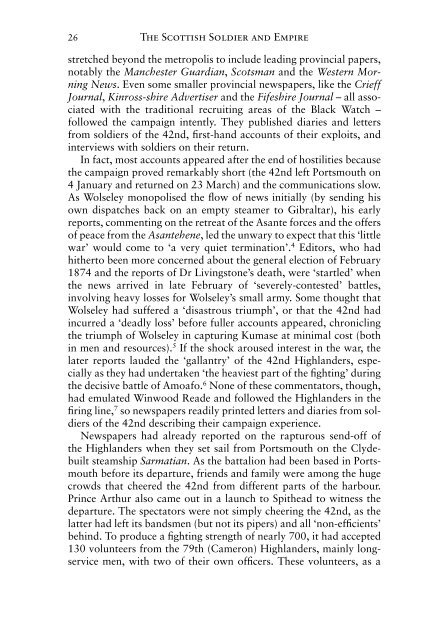The Scottish soldier and Empire, 1854-1902 - Reenactor.ru
The Scottish soldier and Empire, 1854-1902 - Reenactor.ru
The Scottish soldier and Empire, 1854-1902 - Reenactor.ru
You also want an ePaper? Increase the reach of your titles
YUMPU automatically turns print PDFs into web optimized ePapers that Google loves.
26 <strong>The</strong> <strong>Scottish</strong> Soldier <strong>and</strong> <strong>Empire</strong><br />
stretched beyond the metropolis to include leading provincial papers,<br />
notably the Manchester Guardian, Scotsman <strong>and</strong> the Western Morning<br />
News. Even some smaller provincial newspapers, like the Crieff<br />
Journal, Kinross-shire Advertiser <strong>and</strong> the Fifeshire Journal – all associated<br />
with the traditional rec<strong>ru</strong>iting areas of the Black Watch –<br />
followed the campaign intently. <strong>The</strong>y published diaries <strong>and</strong> letters<br />
from <strong>soldier</strong>s of the 42nd, first-h<strong>and</strong> accounts of their exploits, <strong>and</strong><br />
interviews with <strong>soldier</strong>s on their return.<br />
In fact, most accounts appeared after the end of hostilities because<br />
the campaign proved remarkably short (the 42nd left Portsmouth on<br />
4 January <strong>and</strong> returned on 23 March) <strong>and</strong> the communications slow.<br />
As Wolseley monopolised the flow of news initially (by sending his<br />
own dispatches back on an empty steamer to Gibraltar), his early<br />
reports, commenting on the retreat of the Asante forces <strong>and</strong> the offers<br />
of peace from the Asantehene, led the unwary to expect that this ‘little<br />
war’ would come to ‘a very quiet termination’. 4 Editors, who had<br />
hitherto been more concerned about the general election of Feb<strong>ru</strong>ary<br />
1874 <strong>and</strong> the reports of Dr Livingstone’s death, were ‘startled’ when<br />
the news arrived in late Feb<strong>ru</strong>ary of ‘severely-contested’ battles,<br />
involving heavy losses for Wolseley’s small army. Some thought that<br />
Wolseley had suffered a ‘disastrous triumph’, or that the 42nd had<br />
incurred a ‘deadly loss’ before fuller accounts appeared, chronicling<br />
the triumph of Wolseley in capturing Kumase at minimal cost (both<br />
in men <strong>and</strong> resources). 5 If the shock aroused interest in the war, the<br />
later reports lauded the ‘gallantry’ of the 42nd Highl<strong>and</strong>ers, especially<br />
as they had undertaken ‘the heaviest part of the fighting’ during<br />
the decisive battle of Amoafo. 6 None of these commentators, though,<br />
had emulated Winwood Reade <strong>and</strong> followed the Highl<strong>and</strong>ers in the<br />
firing line, 7 so newspapers readily printed letters <strong>and</strong> diaries from <strong>soldier</strong>s<br />
of the 42nd describing their campaign experience.<br />
Newspapers had already reported on the rapturous send-off of<br />
the Highl<strong>and</strong>ers when they set sail from Portsmouth on the Clydebuilt<br />
steamship Sarmatian. As the battalion had been based in Portsmouth<br />
before its departure, friends <strong>and</strong> family were among the huge<br />
crowds that cheered the 42nd from different parts of the harbour.<br />
Prince Arthur also came out in a launch to Spithead to witness the<br />
departure. <strong>The</strong> spectators were not simply cheering the 42nd, as the<br />
latter had left its b<strong>and</strong>smen (but not its pipers) <strong>and</strong> all ‘non-efficients’<br />
behind. To produce a fighting strength of nearly 700, it had accepted<br />
130 volunteers from the 79th (Cameron) Highl<strong>and</strong>ers, mainly longservice<br />
men, with two of their own officers. <strong>The</strong>se volunteers, as a

















